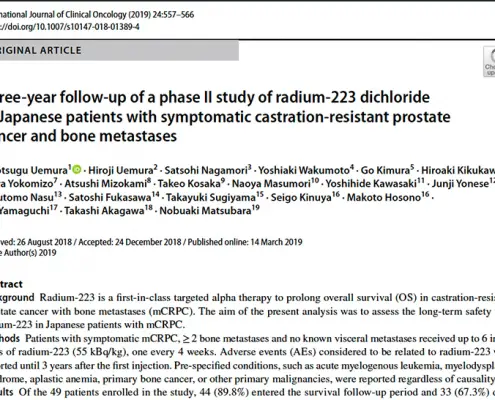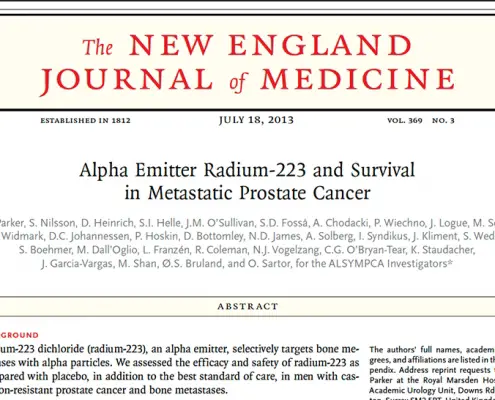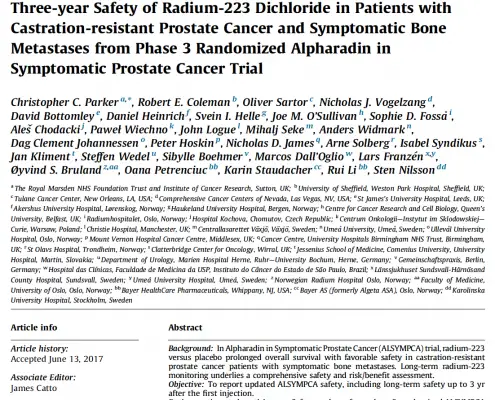What Is Prostate Cancer?
Prostate cancer is one of the most common cancers among men. Approximately 1 in 9 men will be diagnosed with prostate cancer in their lifetime, and it is the second leading cause of cancer-related death in men in the United States.
While the majority of prostate cancers are early stage at diagnosis, a significant portion will have regional or distant metastases.
What Is Radium-223 Therapy (Xofigo)?
Table of Contents
Radium 223 (Xofigo) is a medication used as a treatment against prostate cancer that has spread to a patient’s bones. Xofigo is known to aid in the prevention of symptoms caused by the cancer. It is a radioactive, targeted therapy that involves two main areas of treatment – radioactive and tumour-targeted.
As a radioactive pharmaceutical, Xofigo treats castrate-resistant prostate cancer, symptomatic bone metastases, and no known Visceral Metastatic Disease.
How does Radium-223 Therapy (Xofigo) work?
Radium-223 (Xofigo) is an alpha-emitting radioisotope that mimics calcium. Meaning that when injected, Radium-223 will circulate through the body and form complexes with bony mineral, Hydroxyapatite at the areas of increased bony turnover, such as bone metastases.
As such, Radium-223 (Xofigo) radioactivity can uniquely target areas of sclerotic bony metastases, causing DNA damage to the cancer cells while relatively sparing normal bone due to its short radiation range.
What Are the Expected Outcomes of Radium-223 Therapy (Xofigo)?
The therapy aims to control the bony metastases and reduce bony pain symptoms (if present).
Radium-223 (Xofigo) therapy is a therapeutic agent shown to extend overall survival in patients significantly.
This was demonstrated in a double-blind, randomised, placebo-controlled phase III clinical trial consisting of 921 patients with castrate-resistant prostate cancer with symptomatic bony metastases and no known visceral metastases (Alsympca trial).
Following therapy, there was typically a mild-moderate response in PSA levels (50% producing a drop of more than 30%), while the drop-in ALP levels were typically more dramatic.
The PSA test is a blood test primarily used in the testing for prostate cancer.
What Are the Potential Side Effects of Radium-223 (Xofigo)?
Radium-223 (Xofigo) has a well-documented safety profile. The most common side effect is haematological suppression (lowered red blood cells, white blood cells, and platelets).
Low-grade myelosuppression (Grade 1-2) is common. More severe myelosuppression (Grade 3-4) occurs in approximately 5-10% of patients.
Such haematological suppression is typically temporary. However, the risk of myelosuppression is higher and more refractory in heavily pre-treated patients and those with extensive bony marrow disease.
Other side effects include vomiting, diarrhoea, and generalised weakness, but these are typically temporary and self-limiting.
Who Will Benefit From Treatment With Radium-223 (Xofigo)?
The typical patients who may benefit are those with Metastatic Castrate Resistant Prostate Cancer (mCRPC) with bony metastases and no visceral metastases and biochemical progression.
What Are the Contraindications to Radium-223 (Xofigo)?
Relative contraindications:
- Concurrent Abiraterone acetate, increased risk of fractures and mortality shown
- Impaired marrow function (platelet < 50 x 109/L, Hb < 100 g/L, absolute neutrophil count < 1.5 x 109/L)
- Recent radiotherapy (6 weeks) or concurrent chemotherapy
- Uncontrolled intercurrent illness or poor ECOG status
- Bone scan showing poor bony lesion tracer avidity
Discussion with our physician regarding the potential risks and benefits of therapy will be required before commencing treatment.
What Initial Investigations Are Needed Before Beginning Treatment With Radium-223 (Xofigo)?
Imaging Studies:
- Bone scan (to assess bony metastases tracer avidity)
- PSMA Positron Emission Tomography / Computed Tomography (PET/CT) scan (good to have, to exclude visceral metastases)
Blood Investigations:
- Full Blood Count (FBC)
- Renal Function Test
- Prostate-Specific Antigen (PSA)
- Alkaline Phosphatase (ALP)
- Lactate Dehydrogenase (LDH)
Functional Status:
- ECOG Status Score
What to Expect During Treatment With Radium-223 (Xofigo)?
Radium-223 (Xofigo) therapy can be done on an outpatient basis. It is expected to take approximately 30 minutes in total, and you will be in the Nuclear Medicine department for the duration of the therapy.
Intravenous lines will be required for the therapy. The Radium-223 infusion is given as a slow bolus over 5 minutes, and no immediate side effects are expected.
The infusion should be a painless procedure. After the infusion is done and there are no complications encountered, you will be free to leave the Nuclear Medicine department. If you require admission for observation, we will make the necessary arrangements.
An appointment for the follow-up will be confirmed or arranged for you prior to discharge.
Useful Links
 https://theranostics.sg/wp-content/uploads/2020/03/Xofigo-Japan-Patient-Trial.jpg
546
750
Dr Andrew Tan
https://theranostics.sg/wp-content/uploads/2020/01/Theranostics_logo-1-300x78.png
Dr Andrew Tan2020-03-30 04:14:092022-04-11 17:20:17Xofigo Japan Patient Trial
https://theranostics.sg/wp-content/uploads/2020/03/Xofigo-Japan-Patient-Trial.jpg
546
750
Dr Andrew Tan
https://theranostics.sg/wp-content/uploads/2020/01/Theranostics_logo-1-300x78.png
Dr Andrew Tan2020-03-30 04:14:092022-04-11 17:20:17Xofigo Japan Patient Trial https://theranostics.sg/wp-content/uploads/2020/03/ALSYMPCA-Trial.jpg
546
750
Dr Andrew Tan
https://theranostics.sg/wp-content/uploads/2020/01/Theranostics_logo-1-300x78.png
Dr Andrew Tan2020-03-30 04:13:542022-04-11 17:34:49ALSYMPCA Trial
https://theranostics.sg/wp-content/uploads/2020/03/ALSYMPCA-Trial.jpg
546
750
Dr Andrew Tan
https://theranostics.sg/wp-content/uploads/2020/01/Theranostics_logo-1-300x78.png
Dr Andrew Tan2020-03-30 04:13:542022-04-11 17:34:49ALSYMPCA Trial https://theranostics.sg/wp-content/uploads/2020/03/Screen-Shot-2020-05-14-at-2.30.32-PM.png
1596
1102
Dr Andrew Tan
https://theranostics.sg/wp-content/uploads/2020/01/Theranostics_logo-1-300x78.png
Dr Andrew Tan2020-03-30 04:11:592022-04-12 05:32:55Xofigo 3 year safety profile
https://theranostics.sg/wp-content/uploads/2020/03/Screen-Shot-2020-05-14-at-2.30.32-PM.png
1596
1102
Dr Andrew Tan
https://theranostics.sg/wp-content/uploads/2020/01/Theranostics_logo-1-300x78.png
Dr Andrew Tan2020-03-30 04:11:592022-04-12 05:32:55Xofigo 3 year safety profileWhat are the expected outcomes of Radium-223 Therapy (Xofigo)?
The aim of the therapy is to control the bony metastases and to reduce symptoms of bony pain (if present).
Radium-223 (Xofigo) therapy is a therapeutic agent that was shown to significantly extend overall survival in patients. This was demonstrated in a double blind, randomised, placebo controlled phase III clinical trial of 921 patients with castrate resistant Prostate Cancer with symptomatic bony metastases and no known visceral metastases (Alsympca trial).
Following therapy, there is typically mild-moderate response in PSA levels (50% will have a drop of more that 30%), while drop in ALP levels is typically more dramatic.
What are the potential side effects?
Radium-223 (Xofigo) has a well-documented safety profile.
The most common side effect is hematological suppression (lowered red blood cells, white blood cells and platelets). Low grade myelosuppression (Grade 1-2) is common, while more severe myelosuppression (Grade 3-4) occurs in approximately 5-10% of patients.
Such hematological suppression is typically transient, but the risk of myelosuppression is higher and more refractory in heavily pre-treated patients and those with extensive bony marrow disease.
Other side effects include vomiting, diarrhoea and generalised weakness, but these are typically transient and self limiting.
Who will benefit from Radium-223 (Xofigo) Therapy?
The typical patients who may benefit are those with metastatic Castrate Resistant Prostate Cancer (mCRPC) with bony metastases and no visceral metastases, and with biochemical progression of disease.
What are the contraindications to Radium-223 (Xofigo) Therapy?
Relative contraindications
- Concurrent Abiraterone acetate, increased risk of fractures and mortality shown
- Impaired marrow function (platelet < 50 x 109/L, Hb < 100 g/L, absolute neutrophil count < 1.5 x 109/L)
- Recent radiotherapy (6 weeks) or concurrent chemotherapy
- Uncontrolled intercurrent illness or poor ECOG status
- Bone scan showing poor bony lesion tracer avidity
Discussion with the physician in regards to the potential risks and benefits of therapy will be needed prior to commencing therapy.
What are the initial investigations needed?
Imaging Studies
- Bone scan (to assess bony metastases tracer avidity)
- PSMA Positron Emission Tomography / Computed Tomography (PET/CT) scan (good to have, to exclude visceral metastases)
Blood Investigations
- Full Blood Count (FBC)
- Renal Function Test
- Prostate Specific Antigen (PSA)
- Alkaline Phosphatase (ALP)
- Lactate Dehydrogenase (LDH)
Functional Status
- ECOG Status Score
What to expect during treatment?
Radium-223 (Xofigo) therapy can be done on an outpatient basis. It is expected to take approximately 30 minutes in total, and you will be in the Nuclear Medicine department for the duration of the therapy.
Intravenous lines will be required for the therapy.
The Radium-223 infusion is given as a slow bolus over 5 minutes, and no immediate side effects are expected. The infusion should be a painless procedure.
After the infusion is done and there are no complications encountered, you will be free to leave the Nuclear Medicine department. If you require admission for observation, we will make the necessary arrangements.
An appointment for the follow-up will be confirmed or arranged for you prior to discharge.





